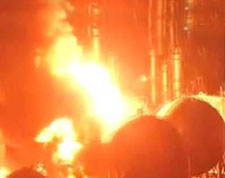When they tried to find anyone who helped with the Alaska oil spill in Prince William Sound, they could not find anybody. Part of that was natural because it was 20 years ago. But part of it was not. See below.
http://english.aljazeera.net/indepth/features/2011/03/201138152955897442.html
| Gulf spill sickness wrecking lives |
|
Nearly a year after the oil disaster began, Gulf Coast residents are sick, and dying from BP’s toxic chemicals.
Dahr Jamail Last Modified: 09 Mar 2011 15:42 GMT
:}
:}
|
 |
|
National and State Parks along the Gulf Coast have posted health warnings along the coast [Erika Blumenfeld/AJE]
|
“I have critically high levels of chemicals in my body,” 33-year-old Steven Aguinaga of Hazlehurst, Mississippi told Al Jazeera. “Yesterday I went to see another doctor to get my blood test results and the nurse said she didn’t know how I even got there.”
Aguinaga and his close friend Merrick Vallian went swimming at Fort Walton Beach, Florida, in July 2010.
“I swam underwater, then found I had orange slick stuff all over me,” Aguinaga said. “At that time I had no knowledge of what dispersants were, but within a few hours, we were drained of energy and not feeling good. I’ve been extremely sick ever since.”
BP’s oil disaster last summer gushed at least 4.9 million barrels of oil into the Gulf of Mexico, causing the largest accidental marine oil spill in history – and the largest environmental disaster in US history. Compounding the problem, BP has admitted to using at least 1.9 million gallons toxic dispersants, including one chemical that has been banned in the UK.
According to chemist Bob Naman, these chemicals create an even more toxic substance when mixed with crude oil. Naman, who works at the Analytical Chemical Testing Lab in Mobile, Alabama, has been carrying out studies to search for the chemical markers of the dispersants BP used to both sink and break up its oil.
Poly-aromatic hydrocarbons (PAHs) from this toxic mix are making people sick, Naman said. PAHs contain compounds that have been identified as carcinogenic, mutagenic, and teratogenic.
“The dispersants are being added to the water and are causing chemical compounds to become water soluble, which is then given off into the air, so it is coming down as rain, in addition to being in the water and beaches of these areas of the Gulf,” Naman told Al Jazeera.
“I’m scared of what I’m finding. These cyclic compounds intermingle with the Corexit [dispersants] and generate other cyclic compounds that aren’t good. Many have double bonds, and many are on the EPA’s danger list. This is an unprecedented environmental catastrophe.”
Aguinaga’s health has been in dramatic decline.
“I have terrible chest pain, at times I can’t seem to get enough oxygen, and I’m constantly tired with pains all over my body,” Aguinaga explained, “At times I’m pissing blood, vomiting dark brown stuff, and every pore of my body is dispensing water.”
And Aguinaga’s friend Vallian is now dead.
“After we got back from our vacation in Florida, Merrick went to work for a company contracted by BP to clean up oil in Grand Isle, Louisiana,” Aguinaga said of his 33-year-old physically fit friend.
“Aside from some gloves, BP provided no personal protection for them. He worked for them for two weeks and then died on August 23. He had just got his first paycheck, and it was in his wallet, uncashed, when he died.”
National health crisis
Many of the chemicals present in the oil and dispersants are known to cause headaches, nausea, vomiting, kidney damage, altered renal function, and irritation of the digestive tract. They have also caused lung damage, burning pain in the nose and throat, coughing, pulmonary edema, cancer, lack of muscle coordination, dizziness, confusion, irritation of the skin, eyes, nose, and throat, difficulty breathing, delayed reaction time and memory difficulties.
Further health problems include stomach discomfort, liver and kidney damage, unconsciousness, tiredness/lethargy, irritation of the upper respiratory tract, hematological disorders, and death. Pathways of exposure to the chemicals are inhalation, ingestion, skin, and eye contact.
Al Jazeera has talked with scores of sick people across the Gulf Coast who attribute their illnesses to chemicals from BP’s oil disaster.
Paul Doom, 22, from Navarre, Florida, was training in preparation to join the US Marines, until he became extremely ill from swimming in the Gulf of Mexico.
“I stopped swimming in July because I started having severe headaches that wouldn’t go away,” Doom told Al Jazeera. “But each time I went to the doctor they dismissed it.”
:}
More tomorrow.
:}
Ben Jervey



 Futaba Kosei Hospital patients who might have been exposed to radiation are carried on stretchers Sunday morning after being evacuated from the hospital in the town of Futaba near the stricken Fukushima Daiichi nuclear power station. (AP / The Yomiuri Shimbun, Daisuke Tomita)
Futaba Kosei Hospital patients who might have been exposed to radiation are carried on stretchers Sunday morning after being evacuated from the hospital in the town of Futaba near the stricken Fukushima Daiichi nuclear power station. (AP / The Yomiuri Shimbun, Daisuke Tomita)
 This first-person view is the most terrifying and astonishing video I’ve seen of the Japan tsunami. Initially everything seems ok, just a mild wave coming towards the camera. But keep watching—the sea goes Godzilla and destroys everything.
This first-person view is the most terrifying and astonishing video I’ve seen of the Japan tsunami. Initially everything seems ok, just a mild wave coming towards the camera. But keep watching—the sea goes Godzilla and destroys everything.
 GENGHIS GREEN: The founder of history’s largest contiguous empire cooled the planet while taking a body count. (Photo: Wiki Commons/public domain)
GENGHIS GREEN: The founder of history’s largest contiguous empire cooled the planet while taking a body count. (Photo: Wiki Commons/public domain)